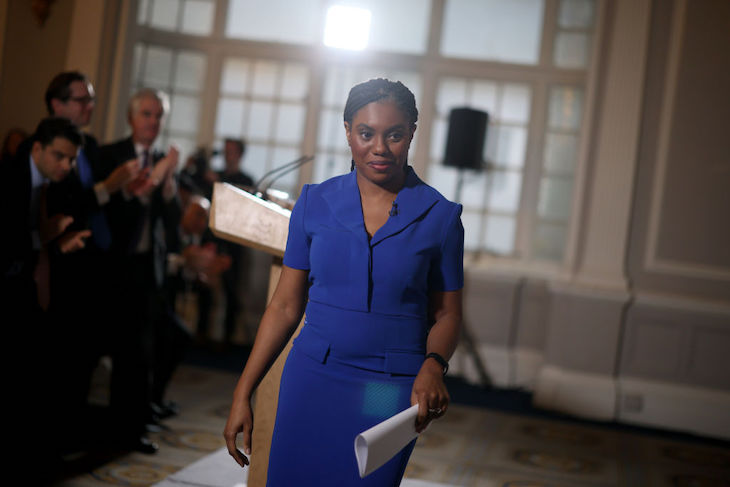Conventional wisdom says the Tory leadership of Kemi Badenoch is close to crisis. This is perhaps because the prevailing political mood is much more heavily influenced by hindsight than by foresight. The manufacture of almost every opinion that gains the status of conventional wisdom depends on a time lag to allow its repetition and dispersal among mid-wit cadres. The polls seem to at least back up the view that Badenoch is in trouble; most aggregation sites put Reform above the Conservatives in terms of average ratings. Yet patterns of opinion recorded in polls are also based on a time lag, capturing the impact of events that first came to public attention a couple of weeks previously.
Badenoch had a bumpy December
There is no doubt that Badenoch had a bumpy December. Her main mistake was to get into a tussle with Nigel Farage about Reform’s membership surge which ended up amplifying it in the public mind. It also made her sound rattled and less than fully authoritative. That skirmish was all of a piece with a more general mishandling of Farage by Badenoch during her early weeks at the Tory helm. Instead of being emollient towards him and stressing the many areas of agreement between them, so as to encourage those Tories who have defected to Reform to start thinking about coming back, she went at him like the proverbial bull at a gate.
Yet she has already learned her lesson and recalibrated. In a major speech yesterday, she aligned herself with voters attracted to the whole panoply of major Reform positions: very sceptical on immigration and carbon net zero, desperate to slice the state down to size, a belief in flag and family, getting the system back on the side of those who work hard, relentlessly anti-Woke. She even sought to gazump Farage’s traditional rabble-rousing question to audiences at live speeches (“Do you want your country back?”) by turning her version into a pledge (“We are going to give you your country back”). In an ensuing question and answer session, she actually offered a spot of ring-fenced deference towards the magnetic maestro by remarking that he had a 20-year head start on her when it came to leading political parties. So now her pitch is, in effect, that while he is great at identifying a lot of what is wrong in society, her USP as “an engineer” will be to design ways to put it right. This is a much more astute approach.
Badenoch has also had a good run when it comes to the dominant emotive story of the year so far: the furore over what the British state should do about Pakistani-heritage rape gangs targeting vulnerable working-class white girls. Reform has held its end up well on the issue too, while Keir Starmer and Labour have performed catastrophically. A similar performance pattern between the three parties is discernible over the economy.
None of this is yet showing up in the polls and nor has Badenoch’s capacity to learn and improve yet cheered up her many doubters in the parliamentary party – certainly not if we go by the summary of the former MP and cabinet minister turned newspaper pundit Nadine Dorries.
She fell upon a critical review of Badenoch’s latest PMQ’s performance written for this very site by Lloyd Evans, reposting an X link highlighting his verdict that “the Tories are sinking under her leaden leadership”. Dorries, never a Kemi fan, claimed: “She’s not working. This tweet is doing the rounds amongst very unhappy Conservative MPs who are all thinking the same.”
Expecting Tory MPs not to lose their nerve is these days akin to asking headless chickens to stop running around. So while Dorries was exaggerating – clearly not all Tory MPs are thinking the same – it may well be that the doubts of December continue to loom large.
Yet this crisis, if crisis it was, is already passing. The main building blocks of a Badenoch plan to rebuild the Tory brand are being put in place. The question of how to handle Farage has largely been resolved. Her team is becoming gradually sharper on how to oppose Labour and get their woman onto the media more. The pitch from her leadership campaign that recovering from the nadir of July 4 will be a long haul is looking ever more sensible.
The most intractable difficulty may well turn out to be the basic ideological incoherence of the party at elite levels. Everyone knows, for instance, what a Reform MP, a Labour MP or a Lib Dem MP will think on the ECHR or the foreign aid bill or expanding non-custodial sentences. What will a Tory MP think? It depends which one you ask.
That’s a problem which cannot be solved by changing the leader, but only by the leader changing the candidates.








Comments